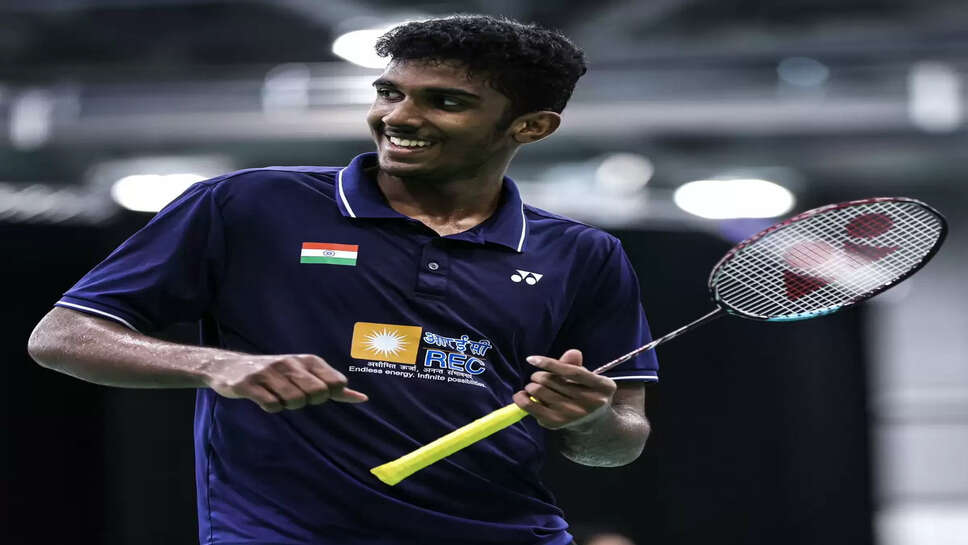Ayush Shetty Crushes Brian Yang to Capture Maiden US Open Crown

In a performance that was as electrifying as it was emphatic, Ayush Shetty etched his name into Indian badminton’s growing list of international champions by clinching the US Open title with a commanding victory over Canada’s Brian Yang. The final, held in Fort Worth, Texas, showcased Shetty’s athleticism, precision, and temperament—traits that are fast becoming synonymous with the rising star of Indian badminton.
Defeating Yang, who is no stranger to the big stage, in straight games, Shetty delivered a masterclass in pace, control, and mental sharpness, leaving both the audience and the badminton world abuzz with admiration. The final scoreline—21-17, 21-13—only hints at the dominance Shetty exhibited, particularly in the closing stages of both games.
This victory marks the biggest international title of Shetty’s career so far and signals a clear message: a new Indian contender is ready to challenge the world’s best.
A Final Worth the Stage
Brian Yang came into the match with experience on his side. The Canadian had been a steady performer on the BWF World Tour and was expected to bring his trademark defensive discipline and sharp net play. But from the very first point, it became evident that Shetty had other plans.
The Indian shuttler, just 20 years old, opened with aggressive intent—using deep smashes and sharp angles to push Yang onto the back foot. His court coverage was exceptional, and his anticipation turned many of Yang’s attempted winners into mere rally starters.
While the first game remained neck-and-neck until the mid-game interval, Shetty found a higher gear when it mattered most. At 17-17, he reeled off four straight points with a mix of net kills and jump smashes, closing the game 21-17 and drawing loud cheers from the small but vocal Indian contingent in the crowd.
Domination in the Second Game
If the first game was a contest of equals, the second was a showcase of superiority. Yang appeared rattled, unable to cope with Shetty’s sudden change of tempo and deceptive strokes. The Indian player, reading the Canadian’s patterns perfectly, pulled away early in the second game and never looked back.
From 7-6, Shetty went on a stunning run to lead 14-8, capitalizing on weak returns and forcing errors from Yang with tight net shots and well-placed body smashes. The fatigue on Yang’s face was clear; Shetty’s unrelenting speed and rhythm had begun to wear him down.
At 19-13, Shetty executed a perfectly disguised crosscourt drop shot—leaving Yang diving in vain. The final point, fittingly, came via a blistering smash that split Yang’s defense wide open. Shetty dropped his racket, pumped his fist, and looked skyward—soaking in the moment of a career-defining victory.
A Star in the Making
Ayush Shetty’s rise has been steady and deliberate. Part of India’s next generation of badminton talent, he’s been under the radar compared to more talked-about names like Lakshya Sen or Priyanshu Rajawat. But insiders in the Indian badminton circuit have long been aware of his ability—his blend of relentless energy, fluid movement, and sharp shot-making.
His path to the US Open title was no cakewalk. He had to overcome stiff competition from experienced international opponents, including a hard-fought semifinal win against Japan’s Koki Watanabe, where Shetty clawed back from a game down to win in three. That comeback, both physical and mental, set the tone for the confidence and clarity he brought into the final.
“I knew I had to play aggressively and not let Brian settle into his rhythm,” Shetty said after the match. “He’s a quality opponent, and I’ve watched his matches over the years. But I backed my game plan today, and I’m really happy it worked.”
The Road Ahead
This US Open title could very well be the launching pad for Shetty’s push into the upper echelons of world badminton. With the Olympics on the horizon and qualification points at a premium, this win adds valuable ranking points to Shetty’s profile, potentially opening doors to higher-tier tournaments and stronger seedings.
More importantly, it shows that India’s bench strength in men’s singles remains robust. With the likes of Srikanth Kidambi and H.S. Prannoy navigating the latter stages of their careers, the emergence of young guns like Shetty ensures continuity—and perhaps, even improvement.
National coach Pullela Gopichand praised Shetty’s maturity, saying, “Ayush has been working very hard, and what we saw today was a result of months of preparation. He’s composed, tactically sound, and hungry. That’s a powerful combination.”
A Win Beyond Medals
Shetty’s win isn’t just another medal in India’s sporting cabinet—it’s also symbolic of a new generation of Indian athletes who are learning to win big abroad, on unfamiliar courts, in hostile conditions. There’s no fear, no awe—just belief.
Fans back home in India took to social media to celebrate the win, with hashtags like #AyushShetty and #USOpenChampion trending for hours. Former players, celebrities, and fellow athletes posted congratulatory messages, hailing his composure and flair.
The victory also underscores the growing visibility and importance of international BWF tournaments like the US Open for players from developing badminton nations. These tournaments are often stepping stones for future world champions—offering experience, ranking points, and the psychological edge of knowing one can win on the global stage.
As Ayush Shetty held the trophy high, his face lit with a mix of pride and calm resolve, it was clear this was more than just a tournament win. It was the arrival of a new contender—a player who has the tools, temperament, and tenacity to go the distance.
“Today is just the beginning,” he said in the post-match interview. “There’s a long way to go. But I know I belong here.”
With that belief, and with a racquet that speaks as fluently as his feet do on court, Ayush Shetty might just be the next big name in Indian badminton.
